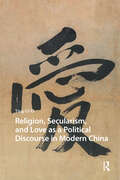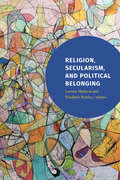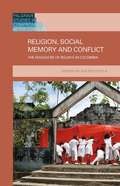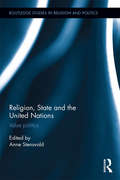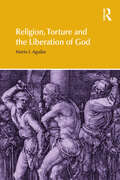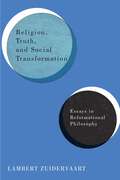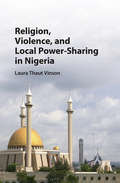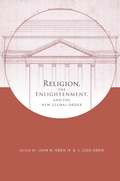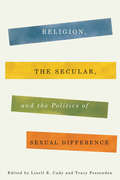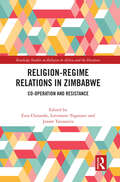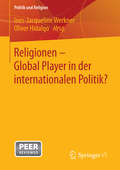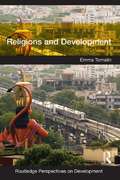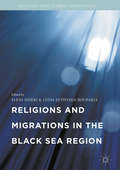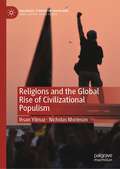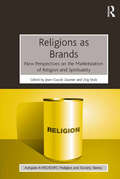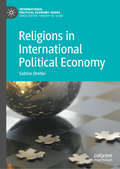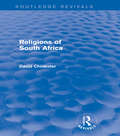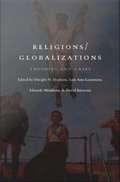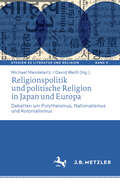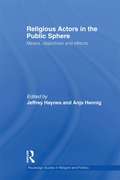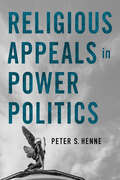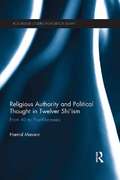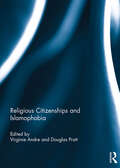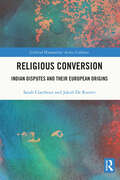- Table View
- List View
Religion, Secularism, and Love as a Political Discourse in Modern China (China: From Revolution to Reform)
by Ting GuoWhat is the meaning of love in modern Chinese politics? Why has ai . (love) been a crucial political discourse for secular nationalism for generations of political leaders as a powerful instrument to the present day? This book offers the first systematic examination of the ways in which the notion of love has been introduced, adapted, and engineered as a political discourse for the building and rebuilding of a secular modern nation, all the while appropriating Confucianism, Christianity, popular religion, ghost stories, political religion, and their religious affects. The insights of this exploration expand not only the discussion of the role of emotions in the project of Chinese modernity, but also the study of affective governance and religious nationalisms around the world today.
Religion, Secularism, and Political Belonging
by Leerom Medovoi and Elizabeth BentleyWorking in four scholarly teams focused on different global regions—North America, the European Union, the Middle East, and China—the contributors to Religion, Secularism, and Political Belonging examine how new political worlds intersect with locally specific articulations of religion and secularism. The chapters address many topics, including the changing relationship between Islam and politics in Tunisia after the 2010 revolution, the influence of religion on the sharp turn to the political right in Western Europe, understandings of Confucianism as a form of secularism, and the alliance between evangelical Christians and neoliberal business elites in the United States since the 1970s. This volume also provides a methodological template for how humanities scholars around the world can collaboratively engage with sweeping issues of global significance.Contributors. Markus Balkenhol, Elizabeth Bentley, Kambiz GhaneaBassiri, David N. Gibbs, Ori Goldberg, Marcia Klotz, Zeynep Kurtulus Korkman, Leerom Medovoi, Eva Midden, Mohanad Mustafa, Mu-chou Poo, Shaul Setter, John Vignaux Smith, Pooyan Tamimi Arab, Ernst van den Hemel, Albert Welter, Francis Ching-Wah Yip, Raef Zreik
Religion, Social Memory and Conflict
by Sandra Milena Rios OyolaThe field of transitional justice and reconciliation considers social memory to be an important mechanism for acknowledging the violation of victims' rights and a step toward building peace. Societies in conflict, such as Colombia, challenge our current understanding of using memory in the construction of social peace processes, which in turn question the impossibility of forgiving violence that is still to come. Drawing on original ethnographical research, Rios analyses strategies of memorialization after the massacre of Bojay#65533;, Colombia, as an arena of political contention but also of grassroots resistance to persistent and diverse forms of violence. The book focuses on the work of the local grassroots Catholic Church and of the victims' association ten years after the massacre of Bojay#65533;. It explores the role of religion in the management of victims' emotions and in supporting claims of transitional justice from a grassroots perspective in a context of thin political transition.
Religion, State and the United Nations: Value Politics (Routledge Studies in Religion and Politics)
by Anne StensvoldThis volume approaches the UN as a laboratory of religio-political value politics. Over the last two decades religion has acquired increasing influence in international politics, and religious violence and terrorism has attracted much scholarly attention. But there is another parallel development which has gone largely unnoticed, namely the increasing political impact of peaceful religious actors. With several religious actors in one place and interacting under the same conditions, the UN is as a multi-religious society writ small. The contributors to this book analyse the most influential religious actors at the UN (including The Roman Catholic Church; The Organisation of Islamic Countries; the Russian Orthodox Church). Mapping the peaceful political engagements of religious actors; who they are and how they collaborate with each other - whether on an ad hoc basis or by forming more permanent networks - throwing light at the modus operandi of religious actors at the UN; their strategies and motivations. The chapters are closely interrelated through the shared focus on the UN and common theoretical perspectives, and pursue two intertwined aspects of religious value politics, namely the whys and hows of cross-religious cooperation on the one hand, and the interaction between religious actors and states on the other. Drawing together a broad range of experts on religious actors, this work will be of great interest to students and scholars of Religion and Politics, International Relations and the UN.
Religion, Torture and the Liberation of God (Religion and Violence)
by Mario I AguilarIf God can be used by the powerful to justify violence in the name of order, he can also be used by the weak to illuminate the position of the victims of political conflict. Religion, Torture and the Liberation of God explores the theological possibilities of a God who is a prisoner and a victim of torture. The book relocates God to the horrors of the military abuse of human rights in Chile and the systematic rape of women in the Democratic Republic of Congo. Aguilar argues that this theological exercise offers us new ways of understanding the abuse of power, whether it be the clerical abuse of children, violence against women, or homophobia. This examination of torture and rape becomes, through a theology of praxis and compliance, an examination of solidarity, love and affection. The book concludes with an exploration of the possibilities of a tortured God who liberates.
Religion, Truth, and Social Transformation: Essays in Reformational Philosophy
by Lambert ZuidervaartReformational philosophy rests on the ideas of nineteenth-century educator, church leader, and politician Abraham Kuyper, and it emerged in the early twentieth century among Reformed Protestant thinkers in the Netherlands. Combining comprehensive criticisms of Western philosophy with robust proposals for a just society, it calls on members of religious communities to transform harmful cultural practices, social institutions, and societal structures.<P><P> Well known for his work in aesthetics and critical theory, Lambert Zuidervaart is a leading figure in contemporary reformational philosophy. In Religion, Truth, and Social Transformation – the first of two volumes of original essays from the past thirty years – he forges new interpretations of art, politics, rationality, religion, science, and truth. In dialogue with modern and contemporary philosophers, among them Immanuel Kant, G.F.H Hegel, Martin Heidegger, Theodor Adorno, Jürgen Habermas, and reformational thinkers such as Herman Dooyeweerd, Dirk Vollenhoven, and Hendrik Hart, Zuidervaart explains and expands on reformational philosophy’s central themes. This interdisciplinary collection offers a normative critique of societal evil, a holistic and pluralist conception of truth, and a call for both religion and science to serve the common good. <P> Illustrating the connections between philosophy, religion, and culture, and daring to think outside the box, Religion, Truth, and Social Transformation gives a voice to hope in a climate of despair.
Religion, Violence, and Local Power-Sharing in Nigeria
by Vinson Laura ThautWhy does religion become a fault line of communal violence in some pluralistic countries and not others? Under what conditions will religious identity - as opposed to other salient ethnic cleavages - become the spark that ignites communal violence? Contemporary world politics since 9/11 is increasingly marked by intra-state communal clashes in which religious identity is the main fault line. Yet, violence erupts only in some religiously pluralistic countries, and only in some parts of those countries. This study argues that prominent theories in the study of civil conflict cannot adequately account for the variation in subnational identity-based violence. Examining this variation in the context of Nigeria's pluralistic north-central region, this book finds support for a new theory of power-sharing. It finds that communities are less likely to fall prey to a divisive narrative of religious difference where local leaders informally agreed to abide by an inclusive, local government power-sharing arrangement.
Religion, the Enlightenment, and the New Global Order (Columbia Series on Religion and Politics)
by J. Owen John Owen IvLargely due to the cultural and political shift of the Enlightenment, Western societies in the eighteenth century emerged from sectarian conflict and embraced a more religiously moderate path. In nine original essays, leading scholars ask whether exporting the Enlightenment solution is possible-or even desirable-today. Contributors begin by revisiting the Enlightenment's restructuring of the West, examining its ongoing encounters with Protestant and Catholic Christianity, Judaism, Islam, and Hinduism. While acknowledging the necessity of the Enlightenment emphasis on toleration and peaceful religious coexistence, these scholars nevertheless have grave misgivings about the Enlightenment's spiritually thin secularism. The authors ultimately upend both the claim that the West's experience offers a ready-made template for the world to follow and the belief that the West's achievements are to be ignored, despised, or discarded.
Religion, the Secular, and the Politics of Sexual Difference (Religion, Culture, and Public Life)
by Tracy Fessenden Linell E. CadyGlobal struggles over women's roles, rights, and dress increasingly cast the secular and the religious in tense if not violent opposition. When advocates for equality speak in terms of rights and modern progress, or reactionaries ground their authority in religious and scriptural appeals, both tend to presume women's emancipation is ineluctably tied to secularization. Religion, the Secular, and the Politics of Sexual Difference upsets this certainty by drawing on diverse voices and traditions in studies that historicize, question, and test the implicit links between secularism and expanded freedoms for women. Rather than position secularism as the answer to conflicts over gender and sexuality, this volume shows both religion and the secular collaborate in creating the conditions that generate them.
Religion,Culture and the State
by Pierre Anctil Howard AdelmanThe Canadian principle of reasonable accommodation demands that the cultural majority make certain concessions to the needs of minority groups if these concessions will not cause 'undue hardship.' This principle has caused much debate in Quebec, particularly over issues of language, Muslim head coverings, and religious symbols such as the kirpan (traditional Sikh dagger). In 2007, Quebec Premier Jean Charest commissioned historian and sociologist Gérard Bouchard and philosopher and political scientist Charles Taylor to co-chair a commission that would investigate the limits of reasonable accommodation in that province.Religion, Culture, and the State addresses reasonable accommodation from legal, political, and anthropological perspectives. Using the 2008 Bouchard-Taylor Report as their point of departure, the contributors contextualize the English and French Canadian experiences of multiculturalism and diversity through socio-historical analysis, political philosophy, and practical comparisons to other jurisdictions. Timely and engaging, Religion, Culture, and the State is a valuable resource in the discussion of religious pluralism in Canadian society.
Religion-Regime Relations in Zimbabwe: Co-operation and Resistance (Routledge Studies on Religion in Africa and the Diaspora)
by Lovemore Togarasei Ezra Chitando Joram TarusariraThis book explores religion-regime relations in contemporary Zimbabwe to identify patterns of co-operation and resistance across diverse religious institutions. Using co-operation and resistance as an analytical framework, the book shows how different religious organisations have interacted with Emmerson Mnangagwa’s "Second Republic", following Robert Mugabe’s departure from the political scene. In particular, through case studies on the Zimbabwe Council of Churches, Zimbabwe Catholic Bishops Conference and Pentecostals, African Traditional Religions, Islam, and others, the book explores how different religious institutions have responded to Mnangagwa’s new regime. Chapters highlight the complexities characterising the religion-regime interface, showing how the same religious organisation might co-operate and resist at the same time. Furthermore, the book compares how religious institutions co-operated or resisted Mugabe’s earlier regime to identify patterns of continuity and change. Overall, the book highlights the challenges of deploying simplistic frames in efforts to understand the interface between politics and religion. A significant contribution to global scholarship on religion-regime interfaces, this book will appeal to academics and students in the field of Religious Studies, Political Science, History and African Studies
Religionen - Global Player in der internationalen Politik?
by Ines-Jacqueline Werkner Oliver HidalgoDer Band untersucht das Agieren religiöser Akteure wie Religionsgemeinschaften und religiös basierte NGOs in der Weltpolitik und fragt nach den Potenzialen und Grenzen ihrer Einflussnahme. Erörtert werden theoretische und normative Aspekte im Verhältnis von Globalisierung, Global Governance und der Revitalisierung von Religion sowie Formen der transnationalen Kooperation zwischen den einzelnen Religionsgemeinschaften. Empirisch werden die für weltpolitische Ambitionen besonders prädestinierten abrahamitischen bzw. monotheistischen Religionsgemeinschaften in den Blick genommen. Auf dem Prüfstand steht die teilweise sehr brisante, ambivalente Rolle, die Christentum, Judentum und Islam im internationalen Kontext einnehmen. Zudem werden konkrete Politikfelder internationalen religiösen Engagements, deren Inhalte und Ziele vorgestellt wie die internationale Friedenspolitik, die Wirtschafts- und Sozialpolitik oder auch die Umweltpolitik.
Religions and Development (Routledge Perspectives on Development)
by Emma TomalinReligion has been excluded from development studies for decades. Religious traditions have contributed greatly towards development work, yet major international players have tended to ignore its role. Recent years have shown a noticeable shift in development policy, practice and research to recognize religion as a relevant factor. This text provides a comprehensive insight into different approaches towards the understanding the relationships between religions and development studies, policy and practice. It guides readers through current debates, presenting, explaining and critically evaluating a broad range of literature and locating it within a theoretical context. The text explores the role of religion within development, from positive contributions, such as the important role that many ‘faith-based organizations’ play in education or health care, to more complicated and contested notions of impact, such as religiously inspired violence or gender inequality. The book begins with three background chapters, outlining the relevance of religions for development studies, policy and practice, and introducing the reader to the study of ‘development’ and of ‘religions’. Following these, the focus then shifts to examine a number of thematic areas, including religion, gender and development, and the implications of the ‘rise of religion’ for mainstream development studies, policy and practice in the 21st century. Each chapter contains a range of features to assist undergraduate learning, including learning objectives for each chapter, discussion of key concepts, summaries, discussion questions, further reading and websites. The book also contains over sixty boxed case studies to provide further definition, explanation, and examples of the interactions between religions and development globally. This innovative text presents religions as something that can both obstruct and aid development, encouraging readers to engage critically with the multiple ways that religion impacts on both the conceptualization of development as well the resulting project interventions. This will be of interest to undergraduate, postgraduate students and scholars interested in religious studies, development studies, and the broader study of societies and cultures.
Religions and Migrations in the Black Sea Region (Religion and Global Migrations)
by Eleni Sideri and Lydia Efthymia RoupakiaThis book focuses on the interconnections of religion and migration in the Black Sea region through case studies that explore shifting identities, community, and national boundaries, as well as social practices and networks. During the past few decades the Black Sea has been transformed from a largely closed region, due to the Cold War, to a bridge for human, economic, and cultural capital flows. As the region opened up, understandings and practices of religion were re-signified due to new and diverse mobilities and resettlements. This volume addresses and responds to the current scarcity of academic research on the repercussion of political reform, migration, and modernization in the areas surrounding the Black Sea. Contributors uncover and examine the pivotal role of religion in current cultural contestations taking place in this strategic region. Engaging with a wide range of case studies, the book offers a fresh, comparative examination of migration as it relates to different countries and religious groups in the region.
Religions and the Global Rise of Civilizational Populism (Palgrave Studies in Populisms)
by Ihsan Yilmaz Nicholas MoriesonThis books explores the rise of civilizational populism throughout the world, and its consequences. Civilizational populism posits that democracy ought to be based upon enacting the ‘people’s will’, yet it adds a new and troubling dimension to populism’s thin ideology: a civilization based classification of peoples and division of society. Today, we increasingly find not conflict between civilizations, but conflict within states over their civilizational identity. From Western Europe to Turkey, and from India and Pakistan to Indonesia, populists are increasingly employing a civilization based classification of peoples in order to define the identities of ‘the people’ and their perceived enemies. This book is the first to examine civilizational populism as global phenomenon rather than a uniquely Western form of politics. Through a series of case studies, the book examines the role played by religion in forming civilizational identities, but also investigates the often deleterious consequences of civilizational populism entering the political mainstream.
Religions as Brands: New Perspectives on the Marketization of Religion and Spirituality (AHRC/ESRC Religion and Society Series)
by Jean-Claude Usunier Jorg StolzDuring the twentieth century, religion has gone on the market place. Churches and religious groups are forced to 'sell god' in order to be attractive to 'religious consumers'. More and more, religions are seen as 'brands' that have to be recognizable to their members and the general public. What does this do to religion? How do religious groups and believers react? What is the consequence for society as a whole? This book brings together some of the best international specialists from marketing, sociology and economics in order to answer these and similar questions. The interdisciplinary book treats new developments in three fields that have hitherto evolved rather independently: the commoditization of religion, the link between religion and consumer behavior, and the economics of religion. By combining and cross-fertilizing these three fields, the book shows just what happens when religions become brands.
Religions in International Political Economy (International Political Economy Series)
by Sabine DreherThis book shows how religions and their internal struggles shape key actors and processes in the international political economy. It highlights how fundamentalist, business-oriented Christians in the United States were instrumental in the neoliberal turn in US hegemony, how Christianity, in the form of prosperity religion, transformed Latin America, and how reactionary religious movements sharpened state competition through illiberal politics in Turkey, India, and elsewhere. But reactionary movements are also confronted by liberationist or more progressive movements, such as Islamic feminism, that seek to build a more inclusive global economy. Religions and their ideas should be seen as a constitutive part of neoliberal globalization and its contestation in IPE.
Religions of South Africa (Routledge Revivals)
by David ChidesterFirst published in 1992, this title explores the religious diversity of South Africa, organizing it into a single coherent narrative and providing the first comparative study and introduction to the topic. David Chidester emphasizes the fact that the complex distinctive character of South African religious life has taken shape with a particular economic, social and political context, and pays special attention to the creativity of people who have suffered under conquest, colonialism and apartheid. With an overview of African traditional religion, Christian missions, and African innovations during the nineteenth century, this reissue will be of great value to students of religious studies, South African history, anthropology, sociology, and political studies.
Religions/Globalizations: Theories and Cases
by David Batstone Eduardo Mendieta Dwight N. Hopkins Lois Ann LorentzenFor the majority of cultures around the world, religion permeates and informs everyday rituals of survival and hope. But religion also has served as the foundation for national differences, racial conflicts, class exploitation, and gender discrimination. Indeed, religious spirituality, having been transformed by contemporary economic and political events, remains both empowering and controversial. Religions/Globalizations examines the extent to which globalization and religion are inseparable terms, bound up with each other in a number of critical and mutually revealing ways. As the contributors to this work suggest, a crucial component of globalization--the breakdown of familiar boundaries and power balances--may open a space in which religion can be deployed to help refabricate new communities. Examples of such deployments can be found in the workings of liberation theology in Latin America. In other cases, however, the operations of globalization have provided a space for strident religious nationalism and identity disputes to flourish. Is there in fact a dialectical tension between religion and globalization, a codependence and codeterminism? While religion can be seen as a globalizing force, it has also been transformed and even victimized by globalization. A provocative assessment of a contemporary phenomenon with both cultural and political dimensions, Religions/Globalizations will interest not only scholars in religious studies but also those studying Latin America, the Middle East, South Asia, and Africa. Contributors. David Batstone, Berit Bretthauer, Enrique Dussel, Dwight N. Hopkins, Mark Juergensmeyer, Lois Ann Lorentzen, Eduardo Mendieta, Vijaya Rettakudi Nagarajan, Kathryn Poethig, Lamin Sanneh, Linda E. Thomas
Religionspolitik und politische Religion in Japan und Europa: Debatten um Polytheismus, Nationalismus und Kolonialismus (Studien zu Literatur und Religion / Studies on Literature and Religion #8)
by David Weiß Michael MandelartzIn der neueren Debatte um das Wechselverhältnis von Religion und Politik hat Japan bislang keine Rolle gespielt; zu Unrecht, wie der vorliegende Band zeigt. Japan dürfte das einzige Land mit polytheistisch geprägter Kultur sein, das dem Imperialismus erfolgreich Widerstand entgegensetzte. Mit dem Aufstieg zur Kolonialmacht und der Erhebung des Shintoismus zur Staatsreligion stellte es die Denkmuster europäischer Überlegenheit infrage. Die polytheistische Religion sollte in diesem Transformationsprozess die historische Kontinuität des neuen Staates verbürgen. Dabei stimmen die rhetorischen Strategien überraschend genau mit dem Rückgriff der deutschen Romantik auf vermeintliche ‚Ursprünge‘ überein. Religiöse Symbolsprachen sind interpretationsoffen gegenüber politischen Deutungen, auch quer zur Unterscheidung von poly- und monotheistischen Religionen. Dies zeigt der Band in fünf Fallstudien von Germanisten und Japanologen.
Religious Actors in the Public Sphere: Means, Objectives, and Effects (Routledge Studies in Religion and Politics)
by Jeffrey Haynes and Anja HennigThis book seeks to argue that religious actors play a crucial role in the complex processes of entering or re-entering the public spheres of state, political, and civil society. Seeking to ameliorate the analytical lacuna and concentrating on both the meso and micro levels of religious public involvement, the contributors explain how representatives from religious and political institutions act and interact in a variety of ways for various purposes. Analysing empirical examples from both Europe and beyond, and including a variety of religions, including multi-faith platforms, the volume examines selected religious actors’ objectives, means and strategies and effects in order to address the following questions: • What are selected religious actors’ public and/or political activities and objectives? • In what ways and with what results do selected religious actors operate in various public spheres? • What are the consequences of religious actors’ political involvement, and which factors condition the degree to which they are successful? Whilst focusing mainly on Europe, the book also utilizes examples from Egypt, Turkey and the USA to provide a valuable and unique comparative focus. The contributors demonstrate that various religious actors, whether functioning as interest groups or social movements, and almost irrespective of the religious tradition to which they belong and the culture from which they emanate, do not necessarily differ markedly in terms of strategies. This important study will be of great interest to all scholars of International Politics, Religion, and Public Policy.
Religious Appeals in Power Politics (Religion and Conflict)
by Peter S. HenneReligious Appeals in Power Politics examines how states use, or attempt to use, confessional appeals to religious belief and conscience to advance political strategies and objectives. Through case studies of the United States, Saudi Arabia, and Russia, Peter S. Henne demonstrates that religion, although not as high profile or well-funded a tool as economic sanctions or threats of military force, remains a potent weapon in international relations. Public policy analysis often minimizes the role of religion, favoring military or economic matters as the "important" arenas of policy debate. As Henne shows, however, at transformative moments in political history, states turn to faith-based appeals to integrate or fragment international coalitions. Henne highlights Saudi Arabia's 1960s rivalry with Egypt, the United States's post-9/11 leadership in the global war on terrorism, and the Russian Federation's contemporary expansionism both to reveal the presence and power of calls for religious unity and to emphasize the uncertainty and anxiety such appeals can create. Religious Appeals in Power Politics offers a bold corrective to those who consider religion as tangential to military or economic might.
Religious Authority and Political Thought in Twelver Shi'ism: From Ali to Post-Khomeini (Routledge Studies in Political Islam)
by Hamid MavaniRanging from the time of the infallible Imams, to the contemporary era, this book provides a comprehensive overview of Shi’i religious and political authority, focusing on Iran and Lebanon, without limiting the discourse to Khomeini’s version of an Islamic State. Utilising untapped Arabic and Persian sources, Hamid Mavani provides a detailed, nuanced, and diverse theoretical discussion on the doctrine of leadership (Imamate) in Shi’ism from traditional, theological, philosophical, and mystical perspectives. This theoretical discussion becomes the foundation for an analysis of the transmission of the Twelfth Imam’s religious and political authority vis-á-vis the jurists during his Greater Occultation. Bringing the often overlooked diversity within the Shi’i tradition into sharp focus, Religious Authority and Political Thought in Twelver Shi’ism discusses what constitutes an Islamic state, if there is such a notion as an Islamic state. Hamid Mavani further explores the possibility of creating a space for secularity, facilitating a separation between religion and state, and ensuring equal rights for all. This book argues that such a development is only possible if there is a rehabilitation of ijtihad. If this were to materialise modern religious, social, economic, political, and cultural challenges could be addressed more successfully. This book will be of use to scholars and students with interests ranging from Politics, to Religion, to Middle East Studies.
Religious Citizenships and Islamophobia
by Virginie Andre and Douglas PrattThe attack on Charlie Hebdo in Paris in January 2015 once again brought to the fore the place of Islam in Western secular democracies, and the questioning of Muslim citizenship. The hyper-mediatisation of jihadist terrorism and its subsequent conflation with Muslim communities in general, has led to both an increase in widespread popular fear of Islam and its followers, and the further marginalization and stigmatization of Muslim communities living in Western societies. This book brings together a range of studies and reflections pertinent to the contemporary issues surrounding religious citizenship and Islamophobia. Sentiments of insecurity and uncertainty, which far-right populist movements focus on, are increasingly finding resonance among ordinary citizens. Some traditional political parties are now flirting with demagogic discourse with respect to matters Islamic to the point where there is a hardening within Western democracies, manifested in the adoption of illiberal policies, the narrowing of the conception of secularity, and the alienation of a younger generation of Muslims. Yet there can still be found both glimmers of hope and slivers of sanity. This book was originally published as a special issue of Islam and Christian-Muslim Relations.
Religious Conversion: Indian Disputes and Their European Origins (Critical Humanities Across Cultures)
by Jakob De Roover Sarah ClaerhoutThis book re-examines the issue of religious conversion, which has been a site of conflict in India for several centuries. It discusses wide-ranging themes such as conversion, education, and reform in colonial India; the process and practices of conversion in Christian Europe; Gandhi, conversion, and the equality of religions; perspectives from Hindu nationalism, secularism and religious minorities; religious freedom and the limits of propagating religion; and conversion in constitutional law, commissions, and courts, to chart new directions for research on religion, tradition, and conversion. Tracing developments from the 19th-century colonial era to contemporary times, the book analyses cultural background frameworks and the origins of religious conversion and its conceptualisation in Western Christianity. It further delves into how Indian culture and its traditions have shaped responses to conversion. Part of the Critical Humanities Across Cultures series, this book will be useful to scholars and researchers of critical humanities, religion, cultural studies, sociology of religion, comparative religion, philosophy, anthropology, theology, Indology, history, politics, postcolonial studies, critical theory, and South Asian studies.
